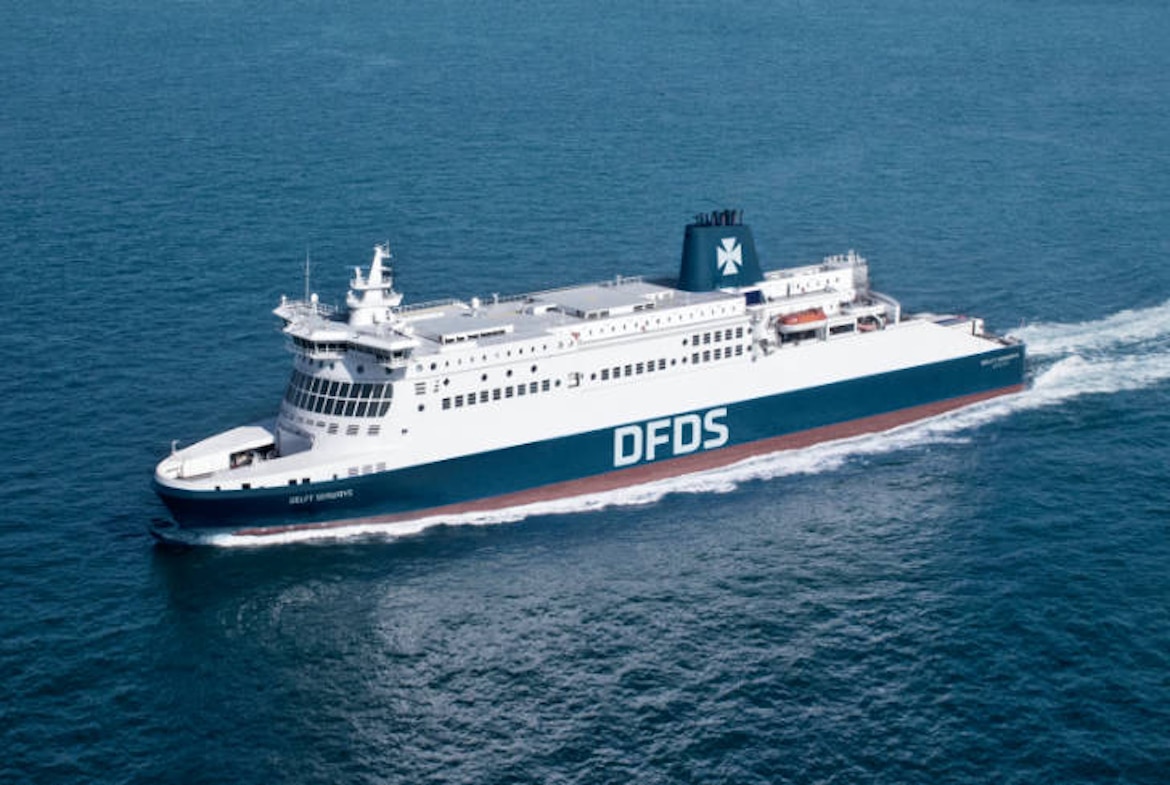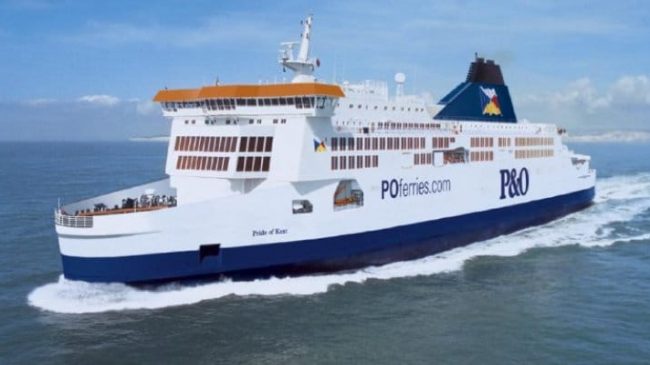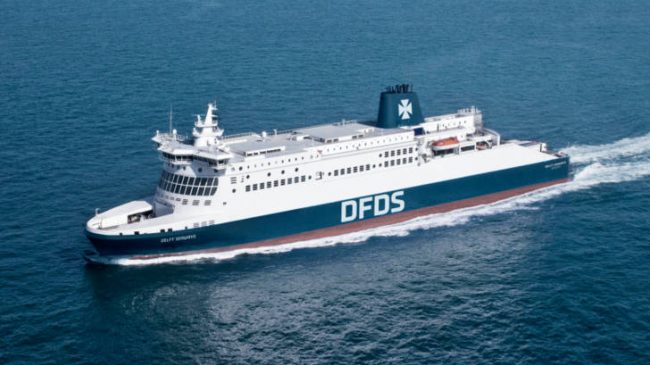
Ferry crossings from Dover to Dunkirk
The ferry from Dover to Dunkirk takes approximately 2 hours and is operated exclusively by DFDS Seaways. This route offers up to 12 daily sailings from each port (up to 24 combined) on modern ferries including the Côte des Flandres, Côte des Dunes and Côte d’Opale.
This crossing provides a convenient link between the southeast coast of England and northern France, offering an alternative to the busier Dover to Calais route with excellent motorway connections to Belgium, the Netherlands and Germany.
Dover ferry port lies in the county of Kent along the southeast coast of England. Dunkirk ferry port lies approximately 40 minutes to the east of Calais near to the Belgian border.
Dover to Dunkirk Ferry Tickets and Prices from £89
The Dover–Dunkirk route is one of the fastest and most convenient ways of getting to northern France, with good road links meaning short driving times to many destinations including Bruges, Brussels and Lille.
The route is also very competitively priced with fares starting from as little as £89 each way for a car and passengers.
With a large number of crossings per day, it’s easy to find a ferry on the timetable to suit your needs and budget.
Booking a Dover to Dunkirk ticket
Book your ferry tickets from Dover to Dunkirk with France Ferry Booker from just £80 and save time and money.
You can book direct with DFDS by simply clicking on the button below.
Dover to Dunkirk Ferry Timetable & Sailings
There are up to 12 sailings a day from Dover to Dunkirk with DFDS, all year round. The crossing takes around 2 hours depending on the weather and tide.
Check-in closes 60 minutes before the departure time for vehicle passengers. All departure/arrival times listed below are subject to change, so please ensure you allow plenty of time and check crossing times before you travel.
Don’t forget to see our Dunkirk to Dover ferry route page for return travel times.
The timetable below shows the approximate check-in, departure and arrival times but please ensure you check before booking as times may change depending upon the day, weather and time of year.
Monday to Friday
| Check-in Closes | Departure | Arrival |
|---|---|---|
| 05:00 | 06:00 | 09:00 |
| 07:00 | 08:00 | 11:00 |
| 09:00 | 10:00 | 13:00 |
| 11:00 | 12:00 | 15:00 |
| 13:00 | 14:00 | 17:00 |
| 15:00 | 16:00 | 19:00 |
| 17:00 | 18:00 | 21:00 |
| 19:00 | 20:00 | 23:00 |
| 21:00 | 22:00 | 01:00 |
| 21:01 | 22:01 | 01:00 |
Saturday
| Check-in Closes | Departure | Arrival |
|---|---|---|
| 05:00 | 06:00 | 09:00 |
| 07:00 | 08:00 | 11:00 |
| 09:00 | 10:00 | 13:00 |
| 11:00 | 12:00 | 15:00 |
| 13:00 | 14:00 | 17:00 |
| 15:00 | 16:00 | 19:00 |
| 17:00 | 18:00 | 21:00 |
| 21:00 | 22:00 | 01:00 |
Sunday
| Check-in Closes | Departure | Arrival |
|---|---|---|
| 07:00 | 08:00 | 11:00 |
| 11:00 | 12:00 | 15:00 |
| 13:00 | 14:00 | 17:00 |
| 15:00 | 16:00 | 19:00 |
| 17:00 | 18:00 | 21:00 |
| 19:00 | 20:00 | 23:00 |
| 21:00 | 22:00 | 01:00 |
Dover to Dunkirk Foot Passenger
It is not possible to travel from Dover to Dunkirk as a foot passenger. This route is for vehicle passengers only.
However, you can travel with a bicycle. Cyclists must arrive at the vehicle check-in lanes and will board the ferry via the vehicle deck. You must be able to carry your own luggage and should wear a high-visibility vest while boarding for safety.
Once you arrive in Dunkirk there are several options for onward travel including car, taxi or train from nearby Dunkirk town which is a short drive or cycle ride from the port.
Getting to Dover Ferry Port
Dover ferry port is conveniently located on the southeast coast of England with excellent motorway links from London and the South East. Here’s how you can get there:
- By Car: Take the M20/A20 or M2/A2 direct to Dover ferry port.
- By Train: High-speed trains run from London St Pancras to Dover Priory in just over 1 hour, then take a short taxi ride to the port.
Travel Tips for Dover to Dunkirk
Discover the best travel tips for your ferry journey from Dover to Dunkirk. Learn about nearby attractions, dining options, and more:
- Nearby Attractions: Explore Dover Castle or the White Cliffs of Dover before your departure.
- Dining Options: There are cafés and restaurants both at the port and in the town centre.
- Packing Tips: Pack light, carry essentials in a small bag, and don’t forget your travel documents.
Onboard Facilities
Travel in comfort with a range of facilities designed to enhance your journey:
- Restaurants: Enjoy hot meals, snacks and drinks.
- Bars: Relax with a drink and sea views.
- Lounges: Comfortable seating areas for relaxation.
- Shops: Duty-free shopping with perfume, cosmetics, confectionery and alcohol.
- Play Areas: Safe and fun play areas for children.
- Wheelchair Accessibility: Accessible facilities including lifts and toilets.
Dover to Dunkirk Route FAQ’s
Our Dover to Dunkirk FAQ’s section helps you to find answers to the most commonly asked questions about the route.
Who operates the route from Dover to Dunkirk?
DFDS Seaways is the only company to operate the crossing, using the Côte des Flandres, Côte des Dunes and Côte d’Opale ferries.
How long is the Dover to Dunkirk crossing?
The crossing from Dover to Dunkirk takes approximately 2 hours, depending on the time of day and weather.
How many crossings are there per day?
DFDS Seaways currently offers up to 12 sailings a day in each direction, with up to 24 combined daily sailings.
Can I travel as a foot passenger?
No, foot passengers are not permitted on this route. Travel is only available for vehicles and bicycles.
What time is the first crossing from Dover to Dunkirk?
The first crossing usually leaves around 03:00, but times do vary depending on the time of year.
What time is the last crossing from Dover to Dunkirk?
The last crossing usually leaves around 23:00, but times do vary depending on the time of year.
Where can I find out more about the return route?
The return Dunkirk to Dover route details can be found by clicking the link.
Visit Dover
Dover is located at the narrowest point along the English Channel. Crossings for passengers, trade and war have departed or arrived in Dover for many centuries with crossing known to have taken place as far back as Roman times.
In the 11th Century, Dover castle was constructed and although there is evidence of previous fortifications, Dover Castle is the largest medieval castle in England. The castle has served an important part in English defences due to Dover being the gateway into England.
There are a variety of attractions not to be missed when you visit Dover. These include the Dover museum which tells the story of Dover’s history, the castle, of course, is a must-see and the white cliffs and tunnel held within should also be seen if at all possible.
The National Trust has completed works of the Fan Bay deep shelter and associated tunnels which were used during WW2 by the Allied forces. These tunnels can be visited and tours are available from Spring until Autumn each year and give a great insight into the hidden work carried out there.
Visit Dunkirk
Dunkirk is located in northern France and is probably most well known for the part it played in WW2 with the evacuation of Allied Forces from mainland Europe.
Dunkirk’s past is inextricably linked to the sea with the town boasting a strong maritime heritage for both fishing and trade. The town’s museums focus on these links to the sea with the Musée des Beaux-Arts which normally displays Italian, Flemish, and French art holding its festival of the sea and sailing.
Within the festival, it’s possible to take a look around some of the boats and sailing ships, try sailing and also view a variety of exhibitions all to do with the sea.
The town’s museum also depicts Dunkirk’s maritime heritage during the period surrounding the War with a wealth of information, displays, and exhibits. There’s plenty to see and do in Dunkirk especially if you’re interested in the history of WW2 so make sure you take the time to stay and visit Dunkirk.









